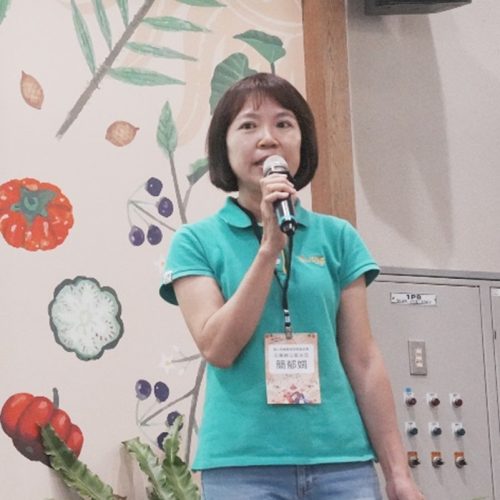Workshops
Sustainable Synergy: Taiwan’s Six-Tier Industry Model for
Organic Market Growth
Introduction
Workshops are independently organised one or more sessions during the Organic World Congress. Workshops allow researchers, farmers, experts and students to meet face-to-face and have interactive discussions.
Workshops address various topics by extending the content of the 4 Tracks through case studies and group discussion.
Detailed Information
Main Topics
- This workshop will explore three main topics crucial for the sustainable development of organic agriculture.
- First, the workshop will delve into the challenges facing sustainable organic farming, examining issues such as market imbalances, supply chain inequities, and environmental concerns.
- Second, the organizational philosophy and practices of the NGO Group (TseXin Organic Agriculture Foundation) and the social enterprise (Leezen Company Limited) will be showcased, demonstrating how their innovative approaches and close collaboration drive organic agriculture towards sustainability. This case study will highlight strategies for integrating economic viability with environmental stewardship and social responsibility.
- Finally, the workshop will broaden the perspective by sharing Taiwan’s experiences in promoting sustainable development within the organic sector. This will include an exploration of successful policies, community engagement initiatives, and cross-sector collaborations that have contributed to the growth of a more sustainable and resilient organic industry in Taiwan. By addressing these topics, the workshop aims to provide attendees with practical insights and actionable strategies for fostering sustainability in organic agriculture across diverse global contexts.
Main Objectives of the Workshop
- The main objective of this workshop is to address the critical challenge of sustainable development in the expanding organic market. As the organic sector grows, conventional market mechanisms often hinder the balanced development of economic, environmental, and social aspects. Issues such as uneven profit distribution along the supply chain, mismatches between production and sales volumes, and overdependence on imported grain practices have emerged, threatening the equilibrium of the ecosystem and fairness within the industry.
- This workshop aims to explore solutions for promoting sustainable development in the organic sector by sharing Taiwan’s experiences with the six-tier industry development model. By examining these case studies, we seek to synthesize effective approaches that integrate primary, secondary, and tertiary industry stakeholders, fostering a more sustainable and equitable organic industry. This collaborative approach is crucial for addressing the imbalances in the current system and ensuring the long-term viability of organic agriculture worldwide.
Main outcomes expected
This workshop is expected to deliver the following three main benefits:
- Innovative Knowledge Transfer: Participants will gain in-depth understanding of Taiwan’s six-tier industry model application in sustainable organic market development, acquiring innovative strategies to address challenges such as uneven profit distribution and production-sales mismatches.
- Cross-sector Collaboration Network: The workshop will provide a platform for various stakeholders in the organic industry chain (such as farmers, processors, marketers, and policymakers) to exchange ideas, fostering cross-sector cooperation and knowledge sharing.
- Practice-oriented Solutions: Through case studies and experience sharing, participants will obtain actionable ideas to promote sustainable growth of organic markets in their local contexts while adhering to organic principles.
Targeted public
Organic Supply Chain, Organic Farming Advocacy Groups, Food Processors, Agricultural Economics Researchers
- This workshop will explore three main topics crucial for the sustainable development of organic agriculture.
- First, the workshop will delve into the challenges facing sustainable organic farming, examining issues such as market imbalances, supply chain inequities, and environmental concerns.
- Second, the organizational philosophy and practices of the NGO Group (TseXin Organic Agriculture Foundation) and the social enterprise (Leezen Company Limited) will be showcased, demonstrating how their innovative approaches and close collaboration drive organic agriculture towards sustainability. This case study will highlight strategies for integrating economic viability with environmental stewardship and social responsibility.
- Finally, the workshop will broaden the perspective by sharing Taiwan’s experiences in promoting sustainable development within the organic sector. This will include an exploration of successful policies, community engagement initiatives, and cross-sector collaborations that have contributed to the growth of a more sustainable and resilient organic industry in Taiwan. By addressing these topics, the workshop aims to provide attendees with practical insights and actionable strategies for fostering sustainability in organic agriculture across diverse global contexts.
- The main objective of this workshop is to address the critical challenge of sustainable development in the expanding organic market. As the organic sector grows, conventional market mechanisms often hinder the balanced development of economic, environmental, and social aspects. Issues such as uneven profit distribution along the supply chain, mismatches between production and sales volumes, and overdependence on imported grain practices have emerged, threatening the equilibrium of the ecosystem and fairness within the industry.
- This workshop aims to explore solutions for promoting sustainable development in the organic sector by sharing Taiwan’s experiences with the six-tier industry development model. By examining these case studies, we seek to synthesize effective approaches that integrate primary, secondary, and tertiary industry stakeholders, fostering a more sustainable and equitable organic industry. This collaborative approach is crucial for addressing the imbalances in the current system and ensuring the long-term viability of organic agriculture worldwide.
This workshop is expected to deliver the following three main benefits:
- Innovative Knowledge Transfer: Participants will gain in-depth understanding of Taiwan’s six-tier industry model application in sustainable organic market development, acquiring innovative strategies to address challenges such as uneven profit distribution and production-sales mismatches.
- Cross-sector Collaboration Network: The workshop will provide a platform for various stakeholders in the organic industry chain (such as farmers, processors, marketers, and policymakers) to exchange ideas, fostering cross-sector cooperation and knowledge sharing.
- Practice-oriented Solutions: Through case studies and experience sharing, participants will obtain actionable ideas to promote sustainable growth of organic markets in their local contexts while adhering to organic principles.
Organic Supply Chain, Organic Farming Advocacy Groups, Food Processors, Agricultural Economics Researchers
Key Info
Dates:
3 Dec 2024
13:30 - 15:00 (GMT+8)
conference room:
C334
Format:
Mainly Chinese with simultaneous English interpretation.
Contact:
Organizer: Tse-Xin Organic Agriculture Foundation
Contact: Jing-Juan Hsu
Target Audience:
Maximum Participants: 50 participants
Chia-Yi Liu
Strategic Management from the Graduate Institute of International Business, National Taiwan University
A Professor in Food Science (Management Division) at Tunghai University, Taiwan, holds a Ph.D. in Strategic Management from the Graduate Institute of International Business, National Taiwan University. Building on her background as an Industrial Analyst at Industrial Technology Research Institute(ITRI), her research interests focus on sustainability issues in the agri-food supply chain.
A Professor in Food Science (Management Division) at Tunghai University, Taiwan, holds a Ph.D. in Strategic Management from the Graduate Institute of International Business, National Taiwan University. Building on her background as an Industrial Analyst at Industrial Technology Research Institute(ITRI), her research interests focus on sustainability issues in the agri-food supply chain.
Yu-Juan Chien
Yu-Juan is the Director of the Eastern Office of the Tse-Xin Organic Agriculture Foundation.
Yu-Juan is the Director of the Eastern Office of the Tse-Xin Organic Agriculture Foundation.
For many years, she has accompanied farmers in the eastern region of Taiwan in organic/eco-friendly farming, helping to linking processing plants and retail channels, and has experience in establishing a six-tier industrial chain.
Yu-Juan is the Director of the Eastern Office of the Tse-Xin Organic Agriculture Foundation.
For many years, she has accompanied farmers in the eastern region of Taiwan in organic/eco-friendly farming, helping to linking processing plants and retail channels, and has experience in establishing a six-tier industrial chain.

